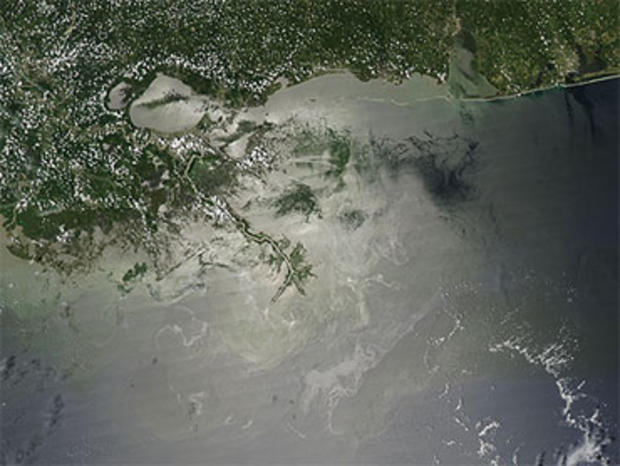Gov't: Vast Majority of Gulf Oil Neutralized
(CBS/AP) Three-quarters of the oil from BP's massive spill has been cleaned up or broken down by natural forces, government scientists report Wednesday.
White House energy adviser Carol Browner said that a new assessment found that about 75 percent of the oil has either been captured, burned off, evaporated or broken down in the Gulf of Mexico.
Browner welcomed news early Wednesday from BP PLC that it has plugged the broken well with heavy mud. The oil giant called it a milestone in ending the spill that started with an April 20 drill rig explosion off Louisiana that killed 11 workers.
"I think we are getting some good news out of the Gulf in terms of the information from the static kill and also what our scientists are telling us - the vast majority of the oil has been contained, it's been burned, it's been cleaned and that's good news for the people of the Gulf," Browner said on CBS' "The Early Show".
Browner said the remaining oil is expected to "break down naturally."
"Mother Nature will do her part, but we'll continue to be vigilant to ensure anything that comes on shore, the tar balls, the sheen, is cleaned up rapidly," she said.
According to the New York Times, most of the remaining oil is a light sheen on the surface or has been dispersed underneath, poses little risk to the environment.
Meanwhile, crews continued to monitor the results of the "static kill" to ensure it remained stable, BP said. They said the well was in "a static condition." They said the well was in "a static condition."
"It's a milestone," BP PLC spokeswoman Sheila Williams said. "It's a step toward the killing of the well."
The next step would be deciding whether to cement the well, Williams said.
It's also possible that more mud could be pumped down the well depending on whether it remains static, reports CBS News correspondent Don Teague.
The pressure in the well dropped quickly in the first 90 minutes of the procedure Tuesday, a sign that everything was going as planned, wellsite leader Bobby Bolton told The Associated Press.
"Pressure is down and appears to be stabilizing," he told the AP Tuesday night.
The static kill procedure -- also known as bullheading -- involved slowly pumping the mud from a ship down lines running to the top of the ruptured well a mile below the surface. BP has said that may be enough by itself to seal the well.
But to call the entire mission a success, crews working on a flotilla of vessels on a desolate patch of water need to seal off the well from two directions.
An 18,000-foot relief well BP has been drilling for the past three months will be used later this month to execute a "bottom kill," in which mud and cement will be injected into the bedrock 2½ miles below the sea floor to finish the job, retired Coast Guard Adm. Thad Allen said.
"There should be no ambiguity about that," Allen said. "I'm the national incident commander, and this is how this will be handled."
A 75-ton cap placed on the well in July has been keeping the oil bottled up inside over the past three weeks, but is considered only a temporary measure. BP and the Coast Guard want to plug up the hole with a column of heavy drilling mud and cement to seal it off more securely.
Before the cap was lowered onto the well, 172 million gallons of crude flowed into the sea, unleashed by the April 20 explosion aboard the drilling rig Deepwater Horizon that killed 11 workers.
BP won't know for certain whether the static kill has succeeded until engineers can use the soon-to-be-completed relief well to check their work.
The task is becoming more urgent because peak hurricane season is drawing near, Allen said.
Tropical Storm Colin formed then dissipated far out in the Atlantic on Tuesday, but early forecasts say it will travel toward the U.S. East Coast rather than the Gulf.
